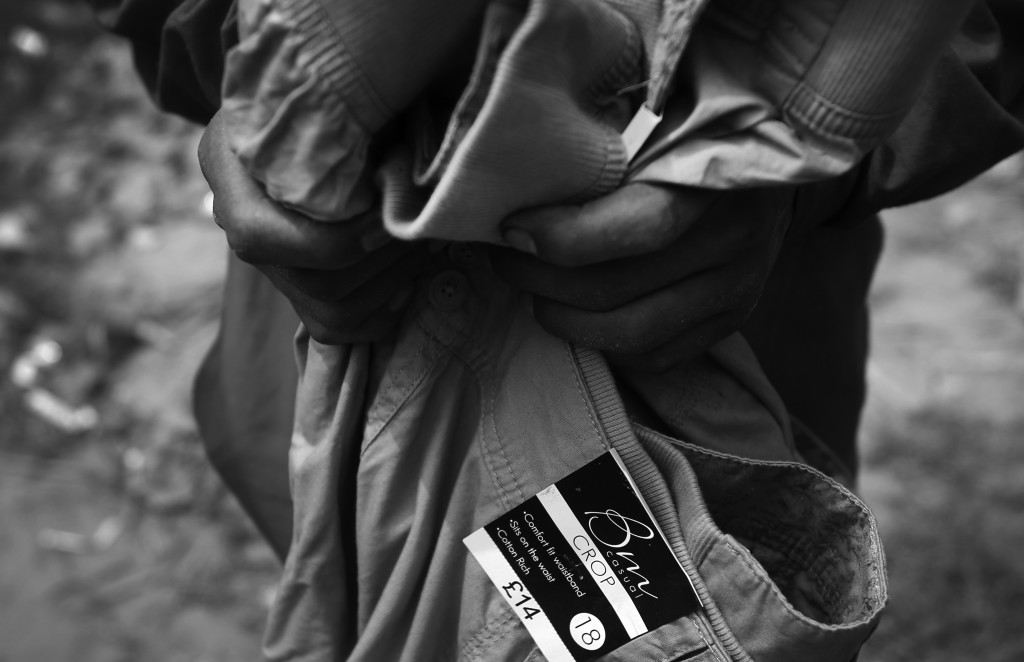
A worker holds clothing retrieved from a collapsed garment factory building on Tuesday, April 30, in Savar, near Dhaka, Bangladesh.
We pay to look good. But recently, workers paid more with their lives.
This truth was brought to light once more, when a garment factory in Savar, Bangladesh imploded on April 24, causing an estimated 377 deaths and more than 1,000 injuries.
As reported by MSNBC, of the nearly 3,000 people who worked at the building, there are still many who remain missing, wounded or trapped beneath the rubble.
This factory, like many still operating throughout the world, manufactured products for American retail stores; this building in particular made items for J.C. Penney, Dress Barn and Joe Fresh, among others.
According to the Associated Press, major retailer WalMart has stated that none of its retail items were authorized to be made in this factory, but they are investigating to see if there was any unauthorized production.
From incidents such as this, we can prompt questions about our buying habits.
Sophomore Shannon Brooks, who is currently majoring in international studies and Spanish, says that the decision to buy clothing made in the U.S. versus that which is manufactured overseas can be difficult because of the workers.
“I buy a lot my clothes from companies like H&M, Forever 21 and Target that have sweatshops in places like Bangladesh and other developing countries,” she said. “The dilemma that I’ve been grappling with lately is that, yes, we are feeding a vicious cycle by supporting these companies that employ people for so little and in often bad conditions. However, very often, the people who work in these factories say that they would prefer that we buy the products they make because it gives them a living.”
Although Brooks admits that continuing to utilize this system may be the lesser of two evils, our society is still helping to employ these workers and giving them a living.
“It’s such a difficult question, but I think I’ve come to the point where I’d rather support them in any way I can rather than boycott it and have nothing really get done,” she said. “I think that if you decide not to support a company, that’s not going to do much. You’d have to go a lot further, but I don’t know what that would be.”
As of now, there are not many major apparel companies in the United States that have American-made products. One example is American Apparel, and some larger brands such as AG Jeans, Levi Strauss and Band of Outsiders do sell items made in the United States, but most American-made products are made by smaller companies.
NuBe Green, a local retailer on Capitol Hill, offers solely American-made products. According to the store’s website, the “strictly” U.S.-made products are also made from “repurposed and organic materials that support local artisans and eliminate new materials and overseas manufacturing.”
Founder Ruth True states on NuBe Green’s website that the store’s mission is to “connect people with the sources of the goods they buy and grow support for local craft and sustainable production.”
While stores such as this help the cause, the implosion in Bangladesh demonstrates how much our society really relies on others for the majority of our products.
Regarding the Bangladesh factory explosion, Charles Kernaghan, director of the Institute for Global Labor and Human Rights, said in a statement that it has been long overdue for countries such as the United States, Canada and Australia to stop relying upon “so-called ‘corporate codes of conduct'” that are never enforced.
“Workers must be guaranteed their legal right to organize independent unions, to bargain collectively and to have a contract that includes decent working conditions and a prohibition of child labor,” he said. “Until workers are afforded their legal labor rights, nothing will change, and the list of tragedies will continue to grow.”
Brooks is currently taking an Introduction to International Studies course, which has focused on the concepts of the positives and negatives of globalization. With this class, as well as following many news organizations online, Brooks has become more interested in where her clothing and products come from, but says that she is still trying to determine how she feels about this concept.
“This is such a complicated issue that it’s just difficult to determine what would be better for the people working in these conditions,” she said. “I think that we’re gradually getting to have better conditions for workers, but I think unfortunately [change] is not happening fast enough.”
While the incident was incredibly devastating, Brooks thinks that we need to take into account the entire situation of sweatshops and the ideals of the workers before making rash judgments.
“I obviously don’t want to tell anyone what to do and I don’t know better than anyone else, but I just think that people really need to think about an issue from all sides and all angles before they just take a stance,” Brooks said.
Grace may be reached at gstetson@su-spectator.com








